
Rufford is a village in West Lancashire, England, where the Leeds and Liverpool Canal, Liverpool, Ormskirk and Preston Railway, the A59 and the River Douglas meet.
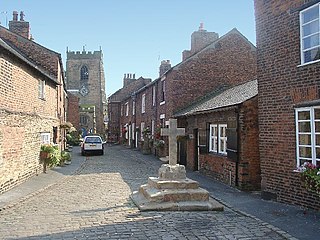
Croston is a village and civil parish in Lancashire, England near Chorley. The River Yarrow flows through the village. The population of the civil parish taken at the 2011 census was 1,280.

Rufford Old Hall is a National Trust property in Rufford, Lancashire, England. Built in about 1530 for Sir Robert Hesketh, only the Great Hall survives from the original structure. A brick-built wing in the Jacobean style was added in 1661, at right angles to the Great Hall, and a third wing was added in the 1820s.
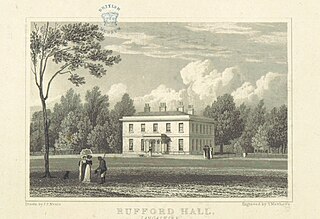
Rufford New Hall is a former country house that belonged to the Heskeths who were lords of the manor of Rufford, Lancashire, England. It replaced Rufford Old Hall as their residence in 1760. From 1920 to 1987 it was used as a hospital and has subsequently been restored and converted for residential use. It was designated a Grade II listed building in 1986.
This is a list of Grade I listed buildings in Lancashire, England.

St Cuthbert's Church is an Anglican church in Churchtown, Merseyside, a village that is now a suburb of Southport in the English county of Merseyside. It is an active parish church in the Diocese of Liverpool and the archdeaconry of Warrington. It has been designated a Grade II listed building by English Heritage. Historically, St Cuthbert's was the parish church of the ecclesiastical parish of North Meols and was within the boundaries of the historic county of Lancashire.
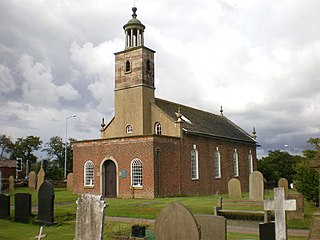
St Mary's Church is a redundant Anglican church on the A59 road as it passes to the south of the village of Tarleton, Lancashire, England. It is recorded in the National Heritage List for England as a designated Grade II* listed building, and is under the care of the Churches Conservation Trust. It is described by the Churches Conservation Trust as a "picturesque early Georgian chapel" with "a lovely unspoiled interior".

Becconsall Old Church is a redundant church in the village of Hesketh Bank, Lancashire, England. It is recorded in the National Heritage List for England as a designated Grade II listed building, and is in the care of the Churches Conservation Trust. It is situated on a lane leading to a boatyard on the River Douglas.

St Peter's Church is in the seaside town of Fleetwood, Lancashire, England, situated on the Fylde coast. It is an active Anglican parish church in the Diocese of Blackburn. It was completed in 1841, to a design by Decimus Burton. Burton had been employed by Peter Hesketh-Fleetwood in 1836 to lay out the new planned town of Fleetwood. It is protected as a Grade II listed building.

Marsh Mill is an 18th-century tower windmill in Thornton, Lancashire, England. It was built in 1794 by Ralph Slater for local landowner Bold Hesketh. It functioned as a corn mill until the 1920s and has been fully restored. It is a good example of a complete English windmill and has been designated a Grade II* listed building.

Fleetwood Museum is a local history and maritime museum in the English seaside town of Fleetwood, Lancashire. The museum was originally the town's Customs House and, completed in 1836, was one of the first buildings constructed in Fleetwood. Like much of the town it was designed by architect Decimus Burton. The building became the local town hall and is now a maritime museum. It has been designated a Grade II listed building by Historic England.
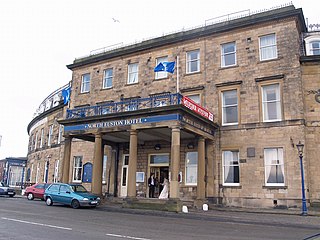
The North Euston Hotel is a hotel in Fleetwood, Lancashire, England. It was built 1840–41, to a design by Decimus Burton. During the second half of the 19th century, the building was used by the War Department as a School of Musketry; by the end of the century it had reverted to its original purpose. The hotel has been designated a Grade II listed building by English Heritage.

Martholme is a grade I listed medieval manor house standing on the banks of the River Calder 1+1⁄4 miles (2 km) from Great Harwood, Lancashire, England and 5 miles (8 km) north-east of Blackburn.

St Bartholomew's Church is in the town of Great Harwood in Lancashire, England. It is an active Anglican parish church in the Diocese of Blackburn. The church is recorded in the National Heritage List for England as a designated Grade II* listed building.
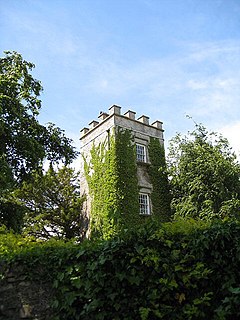
Lindeth Tower is a Victorian folly in Silverdale, Lancashire, England. It is an embattled square tower of three storeys. It was built in 1842 by the Preston banker Hesketh Fleetwood. Elizabeth Gaskell stayed in the tower in the 1840s and 1850s and her novel Ruth was written there. Lindeth Tower is a Grade II listed building.
Penwortham is a civil parish in the South Ribble district of Lancashire, England. It contains 12 buildings that are recorded in the National Heritage List for England as designated listed buildings. Of these, one is listed at Grade II*, the middle grade, and the others are at Grade II, the lowest grade. The parish contains the town of Penwortham and surrounding countryside. The listed buildings include a medieval wayside cross, a church and structures in the churchyard, houses of varying dates, an inn, and a railway viaduct carrying the West Coast Main Line over the River Ribble.
Hesketh-with-Becconsall is a civil parish in the West Lancashire district of Lancashire, England. It contains six listed buildings that are recorded in the National Heritage List for England. All the listed buildings are designated at Grade II, the lowest of the three grades, which is applied to "buildings of national importance and special interest". The parish contains the villages of Becconsall and Hesketh Bank and the surrounding countryside. The listed buildings comprise three houses, a church, and a sundial in the churchyard,
Rufford is a civil parish in the West Lancashire district of Lancashire, England. It contains ten buildings that are recorded in the National Heritage List for England as designated listed buildings. Of these, one is listed at Grade I, the highest of the three grades, and the others are at Grade II, the lowest grade. The parish contains the villages of Rufford and Holmeswood, as well as the surrounding countryside. The most important building in the parish is Rufford Old Hall; this and associated structures are listed. The Rufford Branch of the Leeds and Liverpool Canal passes through the parish and a lock on it is listed. The other listed buildings include houses, a church and a cross base in the churchyard, and a public house.
Shevington is a civil parish in the Metropolitan Borough of Wigan, Greater Manchester, England. The parish contains eight listed buildings that are recorded in the National Heritage List for England. All the listed buildings are designated at Grade II, the lowest of the three grades, which is applied to "buildings of national importance and special interest". The parish contains the villages of Shevington and Gathurst and the surrounding countryside. The Leeds and Liverpool Canal passes through the parish, and the listed buildings associated with it are a bridge, locks, and a lock-keeper's cottage. The other listed buildings are a farmhouse, farm buildings, a public house with a mounting block, and a school and master's house.

Marsh Farmhouse is an historic building in Thornton-Cleveleys, Lancashire, England. Built in 1803, it is a Grade II listed building. It is located to the southeast of today's Amounderness Way roundabout at Victoria Road West.
















